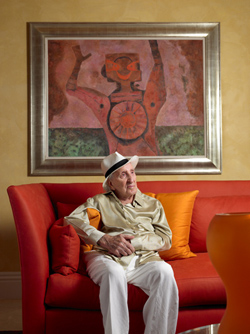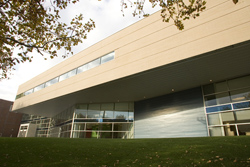Tyler School of Art receives $3.7 million gift to create world's top fine arts prize
 Photo by Kim Sargent
Wolgin
|
Temple University announced today that Jack Wolgin, Philadelphia real estate developer, philanthropist and renowned patron of the arts, has presented Temple's Tyler School of Art with a pledge of $3.7 million to endow the world's largest annual prize to be awarded exclusively to an individual fine artist winning a juried competition. Wolgin's gift, the largest received by Tyler since its inception, will create the $150,000 Wolgin International Prize in the Fine Arts. The prize will be awarded to artists who create work that transcends traditional boundaries and exemplifies the highest level of excellence in painting, sculpture, printmaking, photography, ceramics, metals, glass or fibers. The work of the artists winning the competition — known as the Jack Wolgin International Competition in the Fine Arts at the Tyler School of Art at Temple University — will be the subject of an annual exhibition at Tyler's $75 million, state-of-the-art facility on Temple's Main Campus in Philadelphia. The first |
|
competition will take place in the fall of 2009, followed by an exhibition in the new building's gallery space in October 2009. An international panel of fine arts leaders will nominate artists eligible to compete for the Wolgin International Prize in the Fine Arts. The complete eligibility and nomination process will be determined by Feb. 1, 2009 (updates and information will be posted at the Wolgin Competition's official web site, www.temple.edu/tyler/wolginprize). |
|
| The Centre Square plaza at 15th and Market streets is home to Wolgin's most influential public art commission, Claes Oldenburg's "Clothespin" (1976), an enormous sculpture that Philadelphia Inquirer culture writer Stephan Salisbury has called "the piece that has probably done more than any other work of art or architecture to redefine the [Philadelphia] cityscape." "Jack Wolgin has always been a bold thinker with a reputation for pushing boundaries; he has done it again with the Wolgin Prize," said Therese Dolan, Tyler's interim dean and a leading art historian. "In that sense, he has much in common with the students and faculty of the Tyler School of Art. They share a creative spirit — and now they also share a home and an emotional investment in the city of Philadelphia. It's a perfect match." An active civic leader, Wolgin helped found the Theatre of the Living Arts and has held leadership positions with the City of Philadelphia Art Commission, the Mann |
 Photo by Betsy Manning/Temple University
The work of the artists winning the Jack Wolgin International Competition in the Fine Arts at the Tyler School of Art at Temple University will be the subject of an annual exhibition at Tyler's $75 million, state-of-the-art facility on Temple's Main Campus in Philadelphia. The first competition will take place in the fall of 2009, followed by an exhibition in the new building's gallery space in October 2009.
|
| Center for the Performing Arts, the Institute of Contemporary Art, the Curtis Institute of Music, the Federation of Jewish Agencies, the Philadelphia Fellowship Committee, the Mayor's Commission on Higher Education, the Albert Einstein Medical Center and the Hospital of the University of Pennsylvania. In Israel, where he has made several transformational gifts, Wolgin is a board member of the Israel Museum, the Jerusalem Foundation and the American Friends of Hebrew University. Wolgin's name graces two other major awards: the Wolgin Prize for Israeli Cinema — Israel's equivalent of the Academy Award — is awarded annually at the Jerusalem Film Festival, an event he founded and continues to sponsor; the Wolgin Prize for Scientific Excellence is awarded annually by Israel's Weizmann Institute of Science. For more than 70 years, the Tyler School of Art has offered students the opportunity to pursue study of the arts within small learning communities while providing the advantages afforded by a large comprehensive research institution. The Tyler School offers programs in the fine arts, crafts, graphic and interactive design, art history, art education and architecture. A recognized leader, the Tyler School's graduate programs were ranked 14th in the nation by U.S.News & World Report in 2008, leaping seven spots since art school rankings were last issued in 2003. Tyler's graduate programs in ceramics (ranked 19th in the nation in 2008) and photography (18th) entered the national top 20 for the first time in the school's history, joining the school's longstanding top-ranked graduate programs in painting and drawing (seventh), sculpture (eighth) and printmaking (17th). The school's reputation also has been enhanced by the arrival of a wave of new faculty recruits. Temple has hired more than a dozen new tenured and tenure-track faculty members from the world's leading arts institutions since fall 2006, the largest cohort of new recruits since the school's inception. In January 2009, the school will move from its location in suburban Elkins Park to a new facility at Temple's Main Campus in Philadelphia, adjacent to Temple's Boyer College of Music and Dance and the School of Communications and Theater. Designed by award-winning architect Carlos Jimenez, the 234,000-square-foot structure will provide the school's faculty and students in the studio arts with 40 percent more usable space than Tyler's old facility and four times the amount of gallery space, as well as access to new methods for materials handling and ventilation, the largest greenspace at Temple's Main Campus, secure storage space, new opportunities for interdisciplinary artistic collaboration and a fulcrum for greater community outreach. Freshman applications to the Tyler School of Art at Temple for fall 2008 surged by more than 28 percent compared to fall 2007, an increase that students and Tyler admissions staff attribute to interest generated by the school's new facility. |
|
|
Jack Wolgin speaks about the Jack Wolgin International Competition in the Fine Arts at Tyler School of Art at Temple University Why have a fine arts prize in Philadelphia? Wolgin: "I've lived all my life in Philadelphia. I was born and raised here. I worked all my life to create great public spaces in Philadelphia because I have a great interest in the city's welfare and its rise to prominence in all respects, but especially as an arts center. I have always felt a responsibility to Philadelphia. I have promoted art in different forms and believe it is important for the population to see and experience art so it becomes part of daily life. The Wolgin International Prize in the Fine Arts is my opportunity to make a statement to the world about Philadelphia as a great city for the arts. This is a point of pride for me." Why Temple University and the Tyler School of Art? Wolgin: "I have always been a proponent of education. By having the Wolgin Prize at Temple University's Tyler School of Art, the work of great artists will be seen by (and be an inspiration to) students and Philadelphia residents of all backgrounds. The diversity of Temple's student population and the surrounding neighborhoods is important to me. "The move of the Tyler School of Art to its new facility at Temple's Main Campus in Philadelphia is also meaningful to me. Because Tyler will be part of the city, the art inspired by the Wolgin Prize will be part of the city." Economic benefits Wolgin: "Major international prizes attract a lot of attention. People come from all over to participate. That is what happened in Israel with the Jerusalem Film Festival and the annual Wolgin Prize for Israeli Cinema. The competition has become the largest public gathering in Jerusalem. It's an economic engine. I'd like to see the same thing happen with art in Philadelphia. There are great economic benefits for the city." The importance of prizes Wolgin: "My philosophy about prizes is the reward and recognition of excellence in individual accomplishment. My goal is for the prize to be an incentive for good work. In my home, I have a painting by my friend, the late Mexican artist Rufino Tamayo, that depicts a human figure reaching upward. I like to think that it shows someone reaching for something better in the world. That is how I see this prize: It will be an incentive for artists around the world to reach for that goal. "Individual accomplishment is not sufficiently recognized and acknowledged in today's world. Generally speaking, institutions, with their vast sums of money, have control over creativity. Individual accomplishment is stifled by institutional control. I want to encourage, recognize and reward individual creativity so that it can flourish and continue into the future. Prizes for individual accomplishments are a way to do that." |